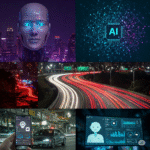Meet Your Future Colleagues: Understanding the Rise of AI Agents

But what exactly is an AI agent? Let’s dive in.
AI Agents: More Than Just Code
In simple terms, an AI agent is an entity that perceives its environment through sensors and acts upon that environment through actuators to achieve specific goals. Think of it like a digital employee:
- Sensors: These are the agent’s senses. For a self-driving car, sensors could be cameras, LiDAR, and GPS. For a chatbot, it’s the text input from a user.
- Actuators: These are the agent’s “hands” or tools to interact with the world. A self-driving car uses actuators to steer, accelerate, and brake. A smart thermostat adjusts the room temperature.
- The “Brain” (Decision-Making): This is where the intelligence lies. The agent processes information from its sensors, considers its goals, and decides what actions to take. This can range from simple if-then rules to complex machine learning models that learn and adapt over time.

These agents aren’t just one-size-fits-all. They come in various forms:
- Simple reflex agents: React to basic stimuli (e.g., a smart light turning on in the dark).
- Model-based agents: Maintain an internal “model” of the world to make more informed decisions.
- Goal-based agents: Work towards specific objectives (e.g., a navigation app finding the quickest route).
- Utility-based agents: Aim to maximize some measure of “happiness” or utility (e.g., a trading bot aiming for maximum profit).
- Learning agents: Can improve their performance over time by learning from experience – the superstars of modern AI!
AI Agents in Your Daily Life (You’re Already Using Them!)
Chances are, you interact with AI agents every single day without even realizing it:
- Your Smartphone Sidekick: Voice assistants like Siri, Google Assistant, and Alexa are prime examples of AI agents. They listen to your commands (sensors) and perform actions like setting reminders, playing music, or answering questions (actuators).
- The Invisible Hand in Your Inbox: Spam filters are AI agents that learn to identify and divert unwanted emails.
- Personalized Shopping & Entertainment: Recommendation systems on Netflix, Spotify, and Amazon are AI agents that analyze your behavior to suggest what you might like next.
- Navigating Your World: GPS and mapping applications use AI agents to find optimal routes, factoring in real-time traffic.
- Smarter Businesses: Robotic Process Automation (RPA) bots are AI agents that handle repetitive administrative tasks, freeing up human workers for more complex roles. Customer service chatbots are increasingly sophisticated, handling queries 24/7.
- The Future of Transport: Self-driving cars are perhaps one of the most complex and talked-about AI agents, making millions of decisions every second to navigate safely.
The Power and Astounding Potential
The beauty of AI agents lies in their ability to:
- Automate the Mundane: Taking over repetitive, time-consuming tasks with speed and accuracy.
- Process Vast Data: Analyzing complex datasets far beyond human capability to uncover insights and patterns.
- Personalize Experiences: Tailoring services and information to individual needs.
- Operate Non-Stop: Unlike us, they don’t need coffee breaks or sleep!
- Enhance Human Capabilities: Acting as powerful tools that augment our own skills and knowledge.
Looking ahead, the potential is even more staggering. Imagine sophisticated AI agents assisting surgeons with unparalleled precision, personalized AI tutors adapting to every student’s learning style, or networks of agents collaboratively tackling climate change by optimizing energy grids and resource management.
Navigating the Agentic Shift: Opportunities and Responsibilities
The rise of AI agents isn’t just about cool tech; it’s a societal shift.
Opportunities:
- New Industries and Jobs: While some tasks will be automated, new roles focused on developing, managing, and overseeing AI agents will emerge.
- Increased Productivity & Innovation: Businesses can become more efficient, leading to economic growth and new discoveries.
- Improved Quality of Life: From better healthcare to more accessible education and entertainment.
Considerations:
- Ethical Dilemmas: How do we ensure fairness and avoid bias in AI decision-making? Who is accountable when an AI agent makes a mistake?
- Job Displacement: We need strategies to support workers as the job market evolves.
- Security and Privacy: How do we protect AI agents from malicious attacks and ensure they handle our data responsibly?
- The “Black Box” Problem: Understanding why some complex AI agents make certain decisions can be challenging, yet crucial for trust and accountability.
Developing and deploying AI agents responsibly is paramount. We need robust ethical guidelines, transparency in how agents work, and a commitment to ensuring these powerful tools benefit all of humanity.
The Future is Agentic
AI agents are no longer a far-off science fiction concept. They are here, integrated into the fabric of our digital lives, and their capabilities are growing exponentially. By understanding what they are, how they work, and their potential impact, we can all play a role in shaping a future where humans and AI agents collaborate to solve a new generation of challenges and unlock unprecedented opportunities.
What are your thoughts on the rise of AI agents? Share them in the comments below!

























































































